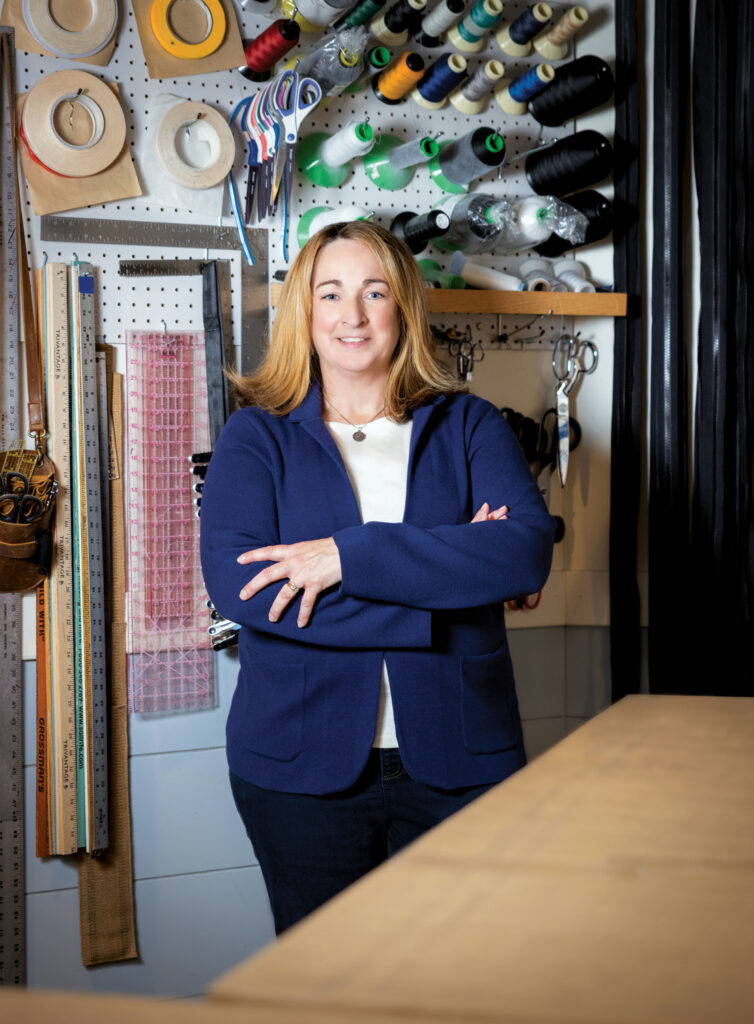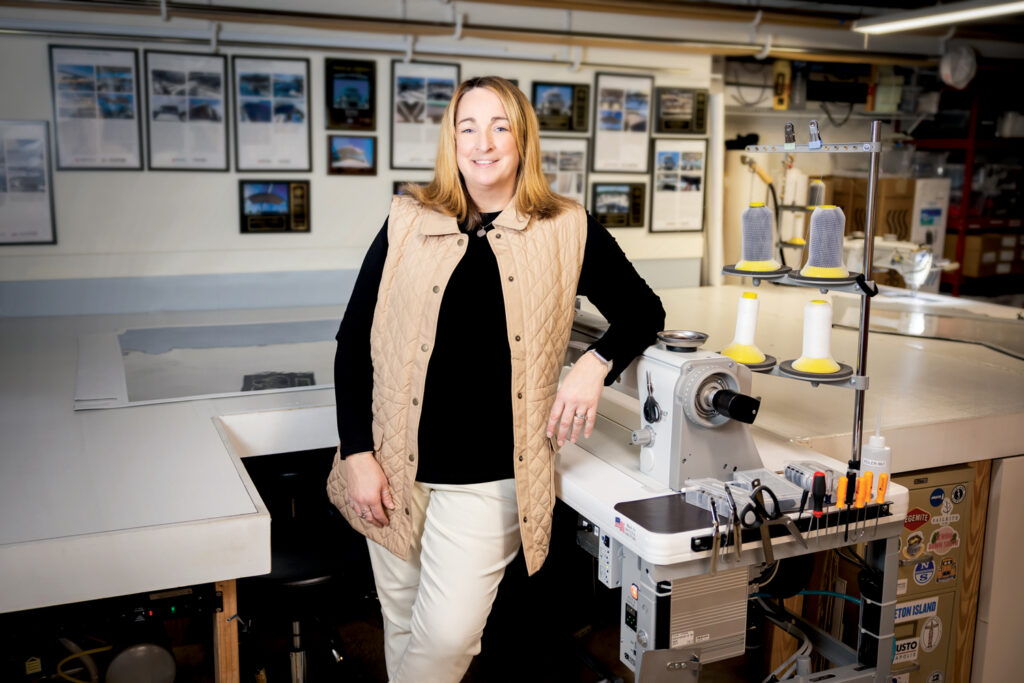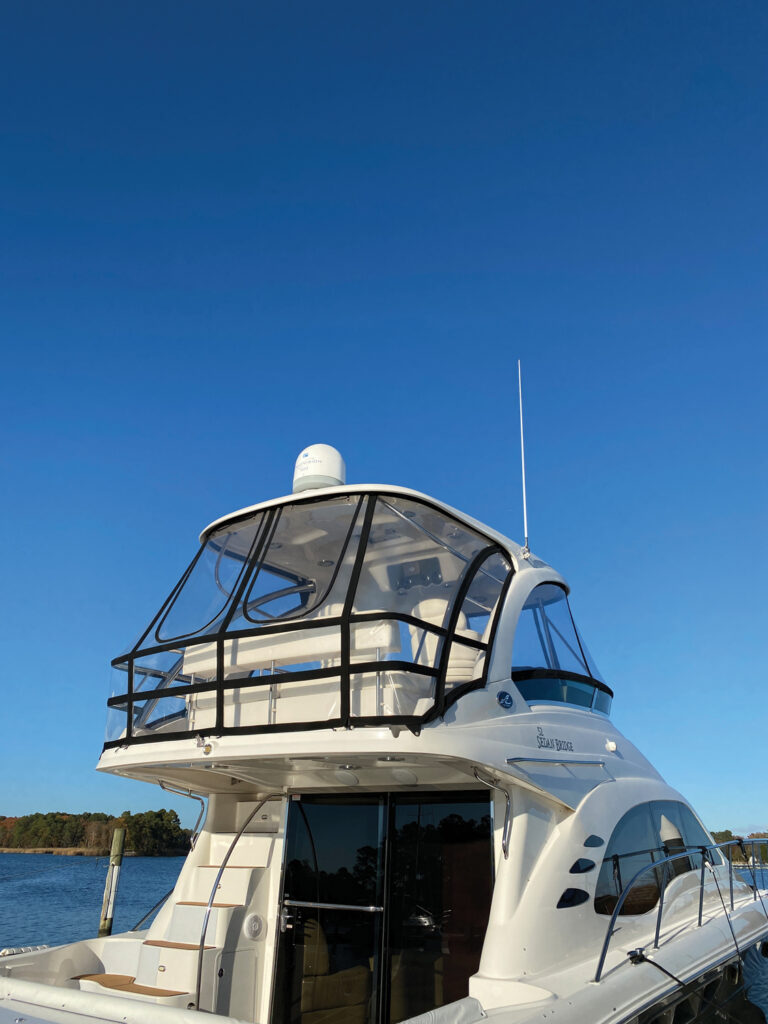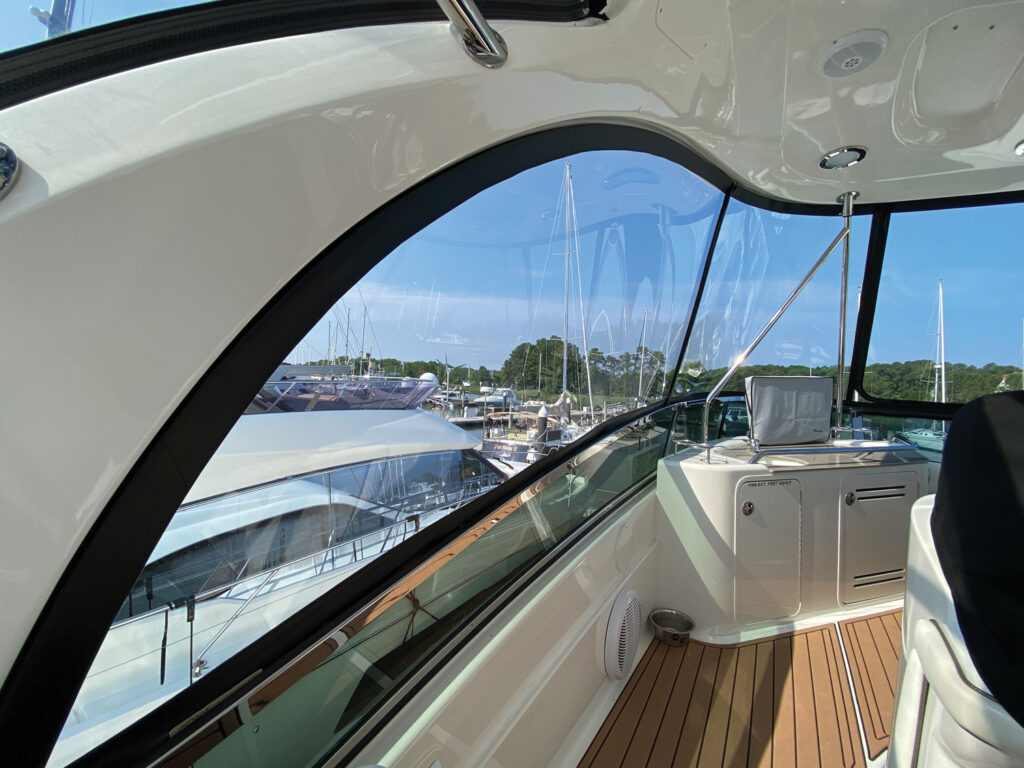
Keri Ames’ career path in the marine fabric world is full of statements that begin with “never did I ever.” Never did she ever think she’d take her family’s sailing hobby to the next level, run a marine canvas business or teach courses through Yachtsman’s Canvas Marine Canvas Training.
“I never imagined all this would come from making a sail cover in 2006 for our sailboat,” says Ames, owner/fabricator at Yachtsman’s Canvas in Rock Hall, Md. “I just wanted to make my husband proud.”
Raised in suburban Philadelphia, Pa., Ames was introduced to sailing when she began dating her future husband, Rich, in 1997. The couple often cruised the Chesapeake Bay with Rich’s grandparents on the family’s 36-foot Sabre sailboat. “I loved the peaceful, quiet experience,” says Ames, an experienced snow skier and tech industry professional. “I was intrigued by how the wind and a piece of fabric made the boat go.”
A few years after Ames married Rich in 2001, the couple discussed the need for a new sail cover. While Ames figured they’d buy one, her husband suggested she make one. “He said, ‘Anything you put your mind to, you can accomplish.’ OK, challenge accepted!”
There were only two issues. “I didn’t own a sewing machine, and I didn’t know how to sew,” says Ames, who was working full time in the software industry at the time.
Undeterred, Ames purchased a $100 home sewing machine and a Sewing for Dummies book. “I fumbled through and made a sail cover. When I look back now, I think, ‘Oh, that wasn’t pretty,’ but I was so proud of that cover when we put it on the boat.”
Ames’ passion for marine canvas fabrication grew as she completed multiple projects for her family’s boat in her spare time. “I liked the creative, hands-on nature of transforming fabric into something useful.”
As she refined her sewing skills, Ames began taking on projects for fellow dock mates and surrounding marinas. While she continued to work in the software industry, Ames set up a five-year plan to leave her corporate job and make marine canvas fabrication her full-time career.

Around 2010, Ames began attending classes at multiple canvas fabrication schools, including Hood Canvas Marine Training in Merrimac, Mass. “This training allowed me to learn a variety of techniques to fabricate custom, high-quality canvas projects,” Ames says.
In 2013, Ames established Yachtsman’s Canvas, which she operated part-time. She also took business classes at a local community college, and by the spring of 2016 she became a full-time entrepreneur. “It was a leap of faith to start my own business, but my husband supported me every step of the way.”
Quality has no compromise
There’s no such thing as a typical day at Yachtsman’s Canvas, which specializes in larger sailboats and powerboats (35 feet and longer).
Ames’ one-person shop offers a full range of boat canvas services, including bimini tops, dodgers, enclosures, helm covers, sail covers, sunshades and more.
During the busy season (April through October), Ames designs patterns, fabricates and installs custom boat-canvas projects for customers around Rock Hall, Md., the surrounding Eastern Shore, northern Chesapeake Bay, the Chesapeake and Delaware (C&D) Canal, and southeastern Pennsylvania. “When you do high-quality work, boat owners will find you,” Ames says.
For each project, Ames follows three guiding principles:
1. Quality has no compromise. Beauty, durability and function are essential, says Ames, who uses industry-tested, marine-grade materials to craft custom boat-canvas projects. “As an avid sailor, boat owner and licensed captain, I understand the importance of high-quality boat canvas,” she says. She earned her Coast Guard captain’s license in the last few years. “I know what does and doesn’t work.”
2. The smallest details have the greatest impact. Expert finishing touches set Ames’ work apart from the competition. “I make the canvas look aesthetically pleasing,” says Ames, who incorporates invisible zippers into many of her projects. “When you stand in the cockpit of a boat, for example, you typically see a lot of zippers. I cover the zippers under fabric.”
3. Style matters. Whether clients want a classic look or a more contemporary style, Ames tailors each project to the customer’s specific needs. “I take the approach of a good interior designer,” she says. This has become even more important following the COVID-19 pandemic. “Since 2020, people have been spending a lot more time on their boats,” Ames notes. “Instead of boating from Friday evening to Sunday afternoon, more people are leaving midweek and are working remotely from their boat. More boat owners want to create more living spaces on board that can handle all kinds of weather.”
While Ames enjoys working on a variety of projects, she follows some valuable advice she gained early in her career. “Know when to say no. It’s easy to take on projects that aren’t right for you or that you just don’t like to do. Learn how to walk that fine line.”
Ames, who has won multiple national and international industry awards, continues to expand her customer base and her knowledge through her involvement in the Chesapeake Marine Canvas Fabricators Association, the Marine Fabricators Association and the Advanced Textiles Association. This network proved invaluable during the supply chain challenges of the pandemic. “If you were looking for a certain type of fabric or zippers but couldn’t get them from your usual suppliers, other fabricators were willing to help out,” Ames says.
“That’s just how fabricators are,” she adds. “I’ve had amazing opportunities to work with the best fabricators in the United States and internationally, including Dave Elliott of David’s Custom Trimmers in Brisbane, Australia. You learn something from every project. The day I stop learning might be the day I hang up my scissors.”
The student becomes the teacher
Ames, who is booked out for projects a year in advance, is grateful for the excellent training she received early in her career from Mark Hood, certified Master Fabric Craftsman, and his wife, Deb. “The Hoods were always passionate about their work. They are great mentors who helped me become the fabricator I am today.”
When the Hoods were ready to retire, Ames worked with them to transition their training business to Yachtsman’s Canvas in October 2023. “I’m grateful the Hoods helped me build my skills and my confidence. It’s important to me to carry on their legacy and help others get into the industry.”
Teaching has become a big part of Ames’ work during the winter months. Her students are typically around middle age. “Some want to start a side business, while others want to switch careers. This training is geared towards people with little or no experience in marine canvas fabrication.”
She hosts three- to four-day workshops focused on specific topics, such as bimini enclosures. Workshops typically include up to three students, so each participant gets plenty of hands-on learning. “There are a lot of fabricators who’ve worked in the business 30 or 40 years and will be retiring soon,” Ames says. “There’s still a lot of business out there, and we need to meet this demand.”
Teaching the next generation of fabricators is a rewarding adventure for Ames. “It’s gratifying to see my career come full circle.”
Darcy Maulsby is a freelance writer based in Lake City, Iowa.
SIDEBAR: Project Snapshot

High-quality finishes create award-winning projects
To achieve the high-quality finishes that define Yachtsman’s Canvas projects, owner/fabricator Keri Ames uses precise fabrication techniques.
Consider the full flybridge enclosure refit she completed on a Sea Ray 52-foot Sedan Bridge powerboat. “I needed to do a full redesign of the enclosure, working within the size constraints of the window material, to provide a modern, open, clean-line design,” Ames says.

She reduced not only the number of panels but also the size of the fabric breaks between panels. She also replaced the protective fabric facing for the stainless steel structure with clear tubing. “I wanted it to ‘disappear’ visually and not stand out as part of the design,” says Ames, who also faced every panel zipper with matching fabric on both the interior and exterior.
Her minimalist design won a 2022 International Achievement Award of Excellence and a 2022 Marine Fabrication Excellence Outstanding Achievement Award.
SIDEBAR: Q&A
What excites you about the future?
I love giving back to this industry. I’m vice chair of the board of the Marine Fabricators Association (MFA) and chair of the MFA Education and Programming Committee for 2024. I’m also excited to offer courses through Yachtsman’s Canvas Marine Canvas Training. I never envisioned myself as a teacher, but I enjoy helping new fabricators get their start in the industry and teaching seasoned fabricators new ways to refine their skills.
 TEXTILES.ORG
TEXTILES.ORG


